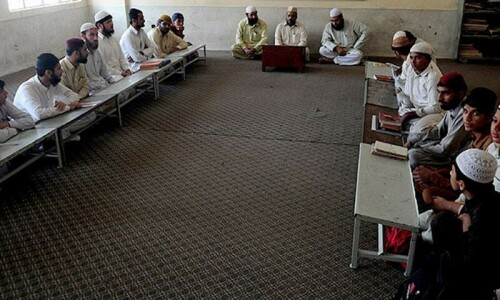I CAN’T say about other music lovers who were born during the middle of the last century, but I became familiar with the word sitar and its sound when I heard the name Ravi Shankar. In other words, sitar and Ravi Shankar were synonymous. It was much later that we became aware of other great names: Vilayat Khan, Imrat Khan, Rais Khan, Nikhil Bannerjee and a host of other exponents of this lovely instrument and fell in love with one or the other artist.
However, if credit is to be given for the popularity of the sitar it must go to Ravi Shankar, for it was he whose keen sense of marketing and effective relationship with the media helped project and promote sitar – and sitarists – not only in the Sub-continent but all over the world.
It is a sad day today. The man who introduced the “queen of instruments” to the world has taken a bow at last, after living a fascinating life for 92 long years.
He was born in 1920 at Banaras. His father Shayam Shankar was a “highly educated and cultured Brahmin from East Bengal. A respected statesman, lawyer and politician, he served for several years as the Diwan of Jhalawar state in Rajasthan.” Syayam Shankar lived most of his life in London, Geneva and New York. He was also a member of the League of Nations in Geneva.
After living his formative years in the spiritual environment of Benaras, where music sank deep into his being, Ravi Shankar got his big break when his eldest brother Uday Shankar introduced him to the glory and riches of the western world. Uday was originally a painter learning at the Royal College of Art in London. The rest of the Shankar family moved to Paris in 1930 when Ravi was ten years old. From now on there was no looking back for Ravi Shankar. He had already started to perform at that young age – in Paris, London, Prague, Germany New York. Not many people know that he could play, besides sitar, such varied instruments as sarod, esraj, sarangi and tabla.
And, of course, he was in his brother Uday Shankar’s dancing troupe as well.
Ravi Shankar’s guru was Baba Allauddin Khan, the great sarod player and father of the world famous Ali Akbar Khan. Both Ali Akbar, who was older, and Ravi sat at the feet of Baba Allauddin Khan for years and learnt the intricacies of raags and raagnies. Later, both of them were to play together – two different instruments, sitar and sarod, playing in jugalbandi for the first time in India.
Ravi Shankar’s close association with Ustad Allauddin Khan lasted till the year 1944, but even after that he continued to visit his guru at Maihar and stay with him for a few months every year.
MEETS ANOTHER GREAT: In the late 1940s Ravi Shankar became the Director of Music in the External Services of All India Radio. And in 1952 he met the famous violinist Yehudi Menuhin for the first time when he came to India. Menuhin was awestruck with the beauty of Indian music. And, thus, began a most enriching relationship between the two great musicians.
During the 1960s, Ravi Shankar was already well-known and popular in the music circles of Europe and America. His performance with Yehudi Menuhin and Ustad Allah Rakha at the United Nations in 1967 was a memorable one. He became especially popular among the western classical and jazz musicians. His fame went far and wide when he performed at the Carnegie hall and other prestigious venues in different countries.
He made friends with musicians, such as George Harrison and the Beetles whom he introduced and taught Indian classical music. Ravi Shankar also worked with the legendary Satyajit Ray and composed beautiful melodies for a number of Indian films – like Anuradha for which he received the President’ s Award. Interestingly, the famous national song, ‘Saray jahan se achcha Hindustan hamara’, written by Allama Iqbal in 1904 was put to tune in 1945 by Ravi Shankar.
During his illustrious career he received innumerable awards, including the Sangeet Natak Academy Award, India’s highest Presidential Award, Gramy Award, Padma Bhushan, Oscar nomination for music in the film Gandhi and many doctorates from various universities of the world. Ravi Shankar Centre, an impressive and large building in New Delhi stands today where professionals and students of music converge to learn classical music and enrich their life.
If only we could see such institutions in our country too, though for sometime past serious efforts have been visible, like the Tehzeeb Foundation organising a grand Sitar Festival in Karachi in which Pakistani sitarists Ustad Rais Khan, Farhan Khan, Ashraf Sharif Khan and others performed and enthralled a large and discerning audience.














































Dear visitor, the comments section is undergoing an overhaul and will return soon.